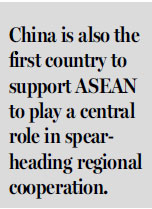China's ties with ASEAN vital to their future
The Association of Southeast Asian Nations, based on the mechanisms it has worked out since its establishment, has set up an ASEAN code of conduct-dialogue, consensus, cooperation and non-interference in other countries' internal affairs - to forge itself into an exemplary regional organization.
ASEAN is committed to building an inclusive community through enhanced internal cohesion and a series of interconnectivity measures aimed at promoting its economic growth, social development and regional stability. When it comes to external ties, ASEAN has been actively cooperating with other economies, through such mechanisms as ASEAN+1, ASEAN+3 and the East Asian Summit, to play a leading role in regional affairs.

Currently, ASEAN is negotiating with six non-ASEAN countries - China, Japan, the Republic of Korea, Australia, New Zealand and India - to facilitate the establishment of a broad free trade area under the Regional Comprehensive Economic Partnership. The 10-member bloc is also pursuing cooperative ties with the United States, Russia, the European Union, as well as Latin American countries, so as to play a greater role in international affairs. So far, 86 countries have sent ambassadors to ASEAN, nine of ASEAN's 11 dialogue partners have set up missions in it, and 50 ASEAN commissions have been established in non-ASEAN economies.















